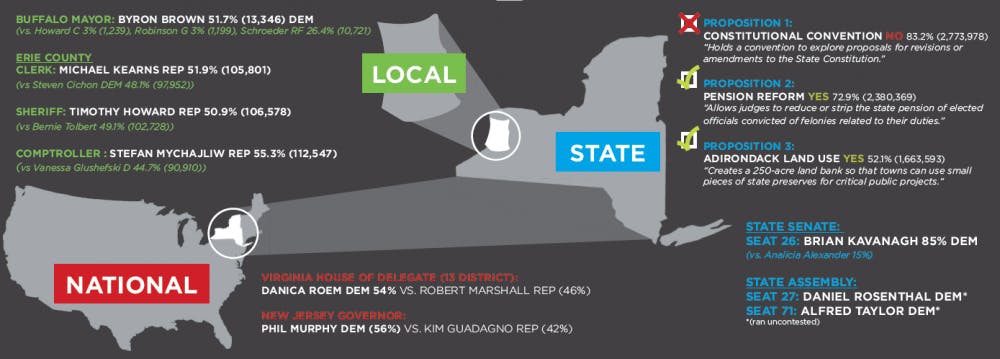Off-year elections in the U.S. are known for abysmal voter turnout, with none of the media frenzy surrounding presidential or midterm elections.
Tuesday night was different.
The election results were marked with historic victories across the country, as scores of transgender, religious and racial minority candidates were voted into office. Andrea Jenkins became the first black transgender person elected to the Minneapolis City Council. Meanwhile, Latina, Vietnamese and religious minority women won in offices across the U.S. In Hoboken, N.J., voters elected their first Sikh mayor.
In New York, voters rejected a constitutional convention with a resounding 83 percent voting “no.” Voters approved two other ballot measures. The first will allow judges to reduce or end a public official’s pension if found guilty of a felony; the second will create a land bank for towns to use small amounts of the Adirondacks for “critical public projects.”
In Erie County, Republicans held onto key offices including Sheriff and Comptroller while Democrats were able to take control of the Erie County Legislature. Mayor Byron Brown was re-elected for a fourth term with 51 percent of the vote. Voter turnout in Western New York was around 30 percent, according to The Buffalo News.
Sharon Nolan-Weiss, director of the Office of Equity, Diversity and Inclusion, said Tuesday night gave underrepresented communities hope for their future. Coming just months after President Donald Trump announced a future ban of all transgender people in the military, Tuesday’s election showed the transgender community that they are supported, Nolan-Weiss explained.
“It’s not easy to be an underrepresented minority, to be a religious minority. There’s always that question of whether I’m going to be accepted. I think for transgender populations, there’s an additional question there, even about safety,” Nolan-Weiss said. “But if the majority of people could vote them into office that’s a sign of a wider acceptance and also that they’re going to have somebody representing them that understands their experience.”
Nolan-Weiss said this election year signals a shift in the country’s attitude toward diversity.
“In the early 2000s, it was thought that if somebody ran for office and they came out as gay, they would never be elected. Yesterday’s elections are showing that these things are not disqualifiers, that anybody in the U.S. can be judged on their merit,” Nolan-Weiss said.
Kira Ashton, a junior computer science and psychology major and College Democrats treasurer, said the most important part of Tuesday’s election was Virginia, where Democrat Ralph Northam defeated Republican Ed Gillespie in a race widely viewed as a national political litmus test.
“As soon as we got home and saw the polls and that [Democratic candidates in] New Jersey and Virginia had won; it was just like proof that the Democrats could run a campaign,” Ashton said. “The governor’s race in Virginia was very intense. A lot of people considered it like a microcosm of the political conversation going on at the national level.”
Jacob Neiheisel, an assistant professor of political science, said this was a relatively difficult election for Republicans in Western New York and around the U.S.
In Erie County, Republican incumbent Sheriff Tim Howard faced a strong challenger in Democrat Bernie Tolbert, according to Neiheisel. Democrats made further gains in the Erie County Legislature, taking control of the previously Republican-controlled lawmaking body. Still, it’s difficult to predict what these races mean for Democrats and Republicans in next year’s election, Neiheisel said.
“I'm always careful about using off-off-year elections to say anything about national trends—they tend to be low salience, low-turnout affairs––but elections have consequences and can send messages,” Neiheisel said. “It just isn't always clear exactly what those are in either case, at least in the short term. Yesterday wasn't a great day for Republicans just about anywhere though.”
Erika Hollis, a junior political science major and president of UB’s College Democrats, said the election results left her “cautiously optimistic” about the Democrats’ midterm chances. Hollis doesn’t think voters understand the importance of off-off-year elections, and how much county legislatures control the day-to-day lives of their constituents.
“Everything from whether Lake Erie is polluted, to whether the Bills get a new stadium, that’s all under the legislature’s jurisdiction,” Hollis said.
As for college students’ turn-out, Hollis and Ashton say they’re optimistic about their peers’ involvement with politics; but that young voters need to show up to vote.
“It’s always been the case that old people vote. They have more stake, they have property, jobs, healthcare policies. Whereas it’s always difficult to get young people politically involved,” Ashton said. “But I honestly think the whole Bernie Sanders movement helped a lot. I think a lot of young people on the left are getting involved in politics; you see more people involved that used to not really care, who were kind of galvanized by Donald Trump’s rhetoric.”
Sarah Crowley is the senior news editor and can be reached at sarah.crowley@ubspectrum.com





